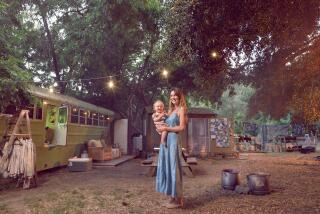On View : An American Family : ‘LAUREL AVENUE’ MARKS A DRAMATIC DIFFERENCE IN FILM PORTRAYALS OF BLACK EXPERIENCES
- Share via
Laurel Avenue is nowhere in Mr. Rogers’ neighborhood. It’s not such a beautiful day in this hood.
The working-class Arnetts of St. Paul, Minn., are weathering several storms at once, and Jake and Maggie Arnett, the heads of the family, are trying to do the right thing in keeping it all together.
Daughter Rolanda Arnett, a single mother and a recovering drug addict, finds herself slipping back into her bad habits after an abusive encounter with a former boyfriend and a failed job interview.
Rolanda’s son, Rushan, is hanging out with hoodlums and bringing drugs into the house. One of the Arnetts’ sons, Marcus, who manages a clothing store that has connections to organized crime, is being lured by a friend to fence steroids to his employers.
Youngest daughter Sheila, who is in high school, goes out with a young man who is so despondent about being kicked off the basketball team that he threatens to shoot himself. She later angers her strict mother by showing her condoms in her purse, kept there for dates.
But through these and other crises that erupt during a fateful weekend, the Arnetts keep in mind how important family is, how the love among family members makes even the most dangerous events less threatening.
The fictional Arnetts and their weekend are the focus of the two-part HBO movie “Laurel Avenue,” premiering Saturday and next Sunday. The film, starring a largely unknown cast, marks “Roc” star Charles S. Dutton’s debut as an executive producer. Carl Franklin, who earned high praise last year with his theatrical film “One False Move,” directs.
“Laurel Avenue” is one of the first contemporary television films revolving around an African-American family. Unlike other recent theatrical films, the world of the Arnetts is not filled with drive-by shootings, violent, angry youths and gunfire, even though an atmosphere of tension and potential violence permeates much of the plot.
Dutton says the drama should not be seen as just the story of an African-American family, but as the story of any American family today.
“This story has things and characters that any American family can relate to,” says Dutton. “It’s the kind of show that anyone can relate to. Any mother, whether lower class, middle class or upper class, will recognize this family and be able to say, ‘I know what they’re going through.’
“This is like everything that is put on every Sunday night about white families--except that those movies are about murder and mayhem. This movie is about love and keeping the family together.”
Playwright Michael Henry Brown, who wrote, co-produced and co-created with executive producer Paul Aaron, says it is important for television to show the diversity in cultures.
“You usually get the two extremes,” says Brown. “You get ‘Boyz N the Hood’ at one end and “The Cosby Show’ on the other end, with nothing in between. I wanted to show something that I was familiar with--to show that there was a large black world out there that hadn’t been seen on television before.”
The show also marks a dramatic change of pace in the portrayal of African-Americans on television. Scholars, experts and industry insiders have long complained that African-Americans are only shown on situation comedy, many of them with one-dimensional characterizations. Dramas featuring blacks are few and far between. Miniseries such as “Queen” or “Roots” put blacks in a historical context as victims.
Chris Albrecht, president of HBO Independent Productions, says, “While comedy is always treading the waters of the African-American community, drama just wasn’t as evident. Given our ability to deal with reality more effectively than the commercial stations, this seemed like a great arena for this kind of show.”
The cable network also is interested in developing a project similar to “Laurel Avenue” that would center on Latinos. “We have a commitment,” Albrecht says. “It’s responsible, and it’s good business.”
The movie was shot over a six-week period in St. Paul. While many of the actors and actresses have appeared in films, plays and in guest shots on television, the most well-known is Mary Alice, a Tony Award-winner for “Fences.”
If “Laurel Avenue” proves to be popular, future installments or a series might be developed, according to HBO.
“It would be interesting to see what the Arnetts are up to around Christmastime,” says Franklin. “The idea originally was to leave this open-ended so that we could do more episodes if it worked out.”
“Laurel Avenue” airs Saturday and next Sunday at 10 p.m. on HBO.
More to Read
Only good movies
Get the Indie Focus newsletter, Mark Olsen's weekly guide to the world of cinema.
You may occasionally receive promotional content from the Los Angeles Times.










